|
|
|
Sort Order |
|
|
|
Items / Page
|
|
|
|
|
|
|
| Srl | Item |
| 1 |
ID:
072895
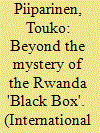

|
|
|
|
|
| Publication |
2006.
|
| Summary/Abstract |
According to the conventional wisdom of the current debate on peacekeeping, the failures of the UN Security Council in general and in Rwanda in particular can be attributed to an absence, not of early warning systems, but of political will on the part of member states. This article argues against the assertion, advanced in much of the existing literature, that political will outweighed early warning in importance. These two factors were interlinked and cannot therefore be compared as if they existed separately. Instead, a more advanced early warning mechanism would have changed the political context so as to facilitate political will to intervene. At a minimal level, such a positive causal relationship would have enabled non-permanent Council members to acknowledge the genocide prior to UNAMIR's (United Nations Assistance Mission for Rwanda) withdrawal and thus to create a political atmosphere of urgency to rescue Rwandans instead of withdrawing troops.
|
|
|
|
|
|
|
|
|
|
|
|
|
|
|
|
| 2 |
ID:
137252
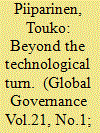

|
|
|
|
|
| Summary/Abstract |
In 2013 the United Nations applied two new peacekeeping instruments, the Intervention Brigade and unmanned aerial vehicles, in the Democratic Republic of Congo. This article argues that the significance and novelty of the Brigade and UAVs for UN peacekeeping are not only attributable to their technologically advanced and robust capacities, as maintained in previous accounts. Most importantly, these instruments also function as the harbingers of a new paradigm for peacekeeping—sovereignty building. The current technological turn of UN peacekeeping is only an epiphenomenon of a more profound paradigm shift in UN peacekeeping toward sovereignty building. Sovereignty building can be defined as an emerging set of peacekeeping practices that aims to create or reinforce four constitutive elements of sovereignty, which have previously been sidelined in state building; namely, sovereign agency (the political will of the host government), sovereign space (the area of supreme state authority), related sovereignty (the sovereignty network of subregional and regional peers), and popular sovereignty (the protection of the population).
|
|
|
|
|
|
|
|
|
|
|
|
|
|
|
|
| 3 |
ID:
146003


|
|
|
|
|
| Summary/Abstract |
The main significance and novelty of the Intervention Brigade established by the United Nations (UN) Security Council in March 2013 in the Democratic Republic of the Congo have previously been attributed to its robust mandate, enhanced capacities and offensive concept of operations. At the tactical, strategic and doctrinal levels of analysis, the Brigade could be considered a continuum of the robust and technological turn of UN peacekeeping, which has continued for more than a decade and is reinvigorated in the so-called new generation of peacekeeping tactics outlined in the New Horizon document. However, this article argues that the most profound significance and novelty of the Brigade reside at the underlying paradigmatic level, which has been ignored in the previous literature. The Brigade embodies not only robust capacities and mandate (peacekeeping with muscles) but also a new peacekeeping paradigm, namely, sovereignty-building (peacekeeping for body politic). The sovereignty-building paradigm is aimed at creating or strengthening the positive and negative sovereignty of the host government. The Brigade reinforces the positive sovereignty of the Congolese government by boosting its self-directive domestic and foreign policy, political will, ownership and responsibility vis-à-vis its regional peers, for example, by making its exit strategy conditional on the Congolese own Rapid Reaction Force. With regard to negative sovereignty, the Brigade contributes to the reinstatement of territorial integrity and supreme state authority by neutralising militia groups.
|
|
|
|
|
|
|
|
|
|
|
|
|
|
|
|
| 4 |
ID:
078700
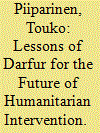

|
|
|
|
|
| Publication |
2007.
|
| Summary/Abstract |
The emergence of post-September 11 military operations in the context of the global fight against terrorism in general and the Iraq war in particular has overshadowed humanitarian interventions conducted by multilateral institutions. However, the threat posed by genocidal governments deserves the continuing attention of global governance because their draconian policies and mobilization capacities constitute the actual weapons of mass destruction against civilian populations. The tardy response of the international community to atrocities in Darfur has been widely regarded as a backlash of the emerging norm in international society which attributes a responsibility to protect civilians targeted by génocidaires. This article, however, will argue that the United Nations, the African Union, the European Union, and NATO have in fact devised and implemented two innovative peacekeeping strategies in Darfur that have set more optimistic precedents for humanitarian intervention, namely, a new division of labor between regional and international organizations and a pragmatic turn in peacekeeping. By dint of these new strategies, intervening organizations have an opportunity to counterbalance the deep-seated problems that routinely affect peacekeeping operations, namely, the body-bag syndrome and the rigidity of bureaucratic norms that regulate PKOs.
|
|
|
|
|
|
|
|
|
|
|
|
|
|
|
|
| 5 |
ID:
090361
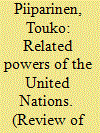

|
|
|
|
|
| Publication |
2009.
|
| Summary/Abstract |
The mainstream literature on the UN has been underlain by a methodological individualist philosophy, according to which all social phenomena, and particularly the functioning of all social institutions, should always be seen as resulting from the decisions of individual actors, as if the whole (organisation) was never more than the sum of its parts (members of an organisation). Such a fallacy has been denounced by social constructivist approaches which account for the existence of certain emergent properties of the UN, such as collective identity, which cannot be reduced to its constituent units, namely, states. These accounts, however, have offered a partial picture of the holistic understanding of the UN, as they have failed to comprehend, or perhaps simply ignored the causal powers of such emergent properties. This article enhances constructivist approaches by dint of the critical realist models of Synchronic Emergent Powers Materialism and Transformational Model of Social Activity. The value added of these two models in comprehending the powers associated with the UN Security Council lies in their ability to function as instructive metaphors; they allow for the independent and irreducible existence of certain mechanisms by which the Council controls international conflicts but nevertheless recognises that these can only emerge from the mutual interaction between agents (states) and structure (UN institutions).
|
|
|
|
|
|
|
|
|
|
|
|
|
|
|
|
| 6 |
ID:
077213
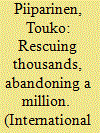

|
|
|
|
|
| Publication |
2007.
|
| Summary/Abstract |
The conceptual analysis of an 'emancipatory intervention', one that frees the people from repressive or genocidal political forces, has attracted scant attention in the debate on international relations. This has been partly due to the fact that the term has been hijacked by the pervasive liberal moral hubris which advocates greater missions1 under the guise of humanitarian intervention. This article aims to revive and reformulate the idea of emancipatory intervention by deriving lessons from Rwanda as an empirical case and by invoking humanitarian realism, which has the potential to move the vision of emancipatory intervention away from liberal interventionism. The 'new yardstick' of assessing emancipatory intervention is less ambitious, but more realistic: it is understood as the extent to which the intervening side might free itself from structural constraints in order to conduct a humanitarian intervention. In the Rwandan case, such possibilities specifically refer to structural cohesiveness, namely the capacity of the UN system to work efficiently when its powers are combined. They include not only the material powers of individual member states, as the mainstream literature has argued, but also rational-legal powers possessed by the UN Secretariat as well as control mechanisms. On this basis, the article constructs a vision of a 'hammer and anvil'peacekeeping operation in Rwanda.
|
|
|
|
|
|
|
|
|
|
|
|
|
|
|
|
| 7 |
ID:
126447
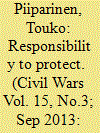

|
|
|
|
|
| Publication |
2013.
|
| Summary/Abstract |
The principle of Responsibility to Protect (RtoP) requires states and international society as a whole to protect civilians from genocide, crimes against humanity, war crimes and ethnic cleansing. This article argues that, instead of considering RtoP as a continuum to the humanitarian intervention doctrine aimed at performing limited protection tasks, RtoP might best be understood as a form of another doctrine which has been recently emerging in global conflict management, namely sovereignty-building. The main value added of this methodological shift resides in its potential to show that RtoP involves not only limited functions of short-term rescue and protection of civilians from immediate physical harm but also more long-term and ambitious efforts aimed at building responsible sovereigns and transforming societies. RtoP projects two kinds of images of responsible sovereignty on weak, fragile and failed states: the 'Bodinian' image, which implicates institution-building, reconstruction and empowerment of societies emerging from civil war and the 'Lockean' image, which refers to attempts to socialise states to a global human rights culture, by means of collective peer pressure, political and diplomatic means, and the use of coercive force, as demonstrated by military interventions in Libya and Côte d'Ivoire in 2011. This article argues that the sovereignty-building paradigm embodied in RtoP also involves potential pitfalls: it gives an opportunity for sub-state actors such as rebel groups to manipulate RtoP as an instrument (or weapon) to enhance their own political objectives in civil wars against incumbent national authorities.
|
|
|
|
|
|
|
|
|
|
|
|
|
|
|
|
| 8 |
ID:
085403
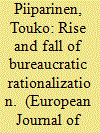

|
|
|
|
|
| Publication |
2008.
|
| Summary/Abstract |
If it is correct to say that the UN's policy has been dominated by great powers, then it is also true that the academic debate on the UN's failures in general, and the Rwandan tragedy in particular, has been dominated by an emphasis on Realpolitik , which has limited and precluded analysis of other possible causes of the UN's malfunctions. Power politics alone cannot fully explain why the downfall of `grand strategies' for the UN envisaged in Secretary-General Boutros Boutros-Ghali's An Agenda for Peace (1992), most notably conflict prevention, was almost as rapid as their emergence. By drawing upon new empirical evidence from interviews and by reflecting on theories of bureaucratization, this article explores one previously ignored mechanism underlying the failure of the Agenda in general and the Rwandan case in particular, namely bureaucratic rationalization.
|
|
|
|
|
|
|
|
|
|
|
|
|
|
|
|
| 9 |
ID:
116137
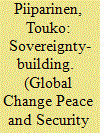

|
|
|
|
|
| Publication |
2012.
|
| Summary/Abstract |
This article argues that the increasingly frequent and robust implementation of the Responsibility to Protect (RtoP) principle reflects not only the operation of the functionally narrow doctrine of humanitarian intervention, but also the emergence of a new paradigm of global security, namely sovereignty-building. RtoP protects populations from mass atrocity crimes, supports and builds responsible sovereigns committed to protecting their populations, and restrains 'irresponsible' sovereigns. These functions of RtoP perfectly capture the sovereignty-building paradigm. This article will draw upon the philosophical literature on sovereignty, the analysis of the norm development of RtoP, and empirical evidence of the UN Security Council's deliberations on the situation in Libya in 2011 to argue that the image of responsible sovereignty featured in RtoP is composed of three aspects: popular, spontaneous and indivisible sovereignty. That image is projected on states in the implementation of RtoP, and constitutes the teleological objective of the emerging paradigm of sovereignty-building, which can be distinguished from the traditional doctrines of state-building and humanitarian intervention.
|
|
|
|
|
|
|
|
|
|
|
|
|
|
|
|
| 10 |
ID:
129832
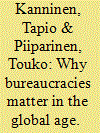

|
|
|
|
|
| Publication |
2014.
|
| Summary/Abstract |
This article will challenge the conventional wisdom according to which international bureaucracies are unviable and undesirable in the age of globalisation. The relevance and powers of today's international bureaucracies can best be understood by reference to the model of the 'network logic of globalisation' rather than Max Weber's classic theory alone. Bureaucracies are undergoing a transformation from the rigid and hierarchical institutions of Weber's time to more network-oriented and delayered post-Weberian entities. On occasion, these post-Weberian structures allow middle-level officials in international organisations to wield considerable new bureaucratic powers. The case study of this article draws upon empirical evidence on the drafting and implementation of An Agenda for Peace (1992) by UN Secretariat officials and its contributions to the United Nations early warning and conflict prevention mechanism. The network-oriented structures and approaches have started to permeate the UN Organisation in two ways: First, the United Nations operates more and more through interdepartmental and interagency teams. This trend was evident already in the drafting and implementation processes of the Agenda. Second, the United Nations is reaching out to academic and civil society networks. The start of these two transformations of the UN bureaucracy is related to globalisation and can be seen already in action in the early 1990s when the Agenda was drafted.
|
|
|
|
|
|
|
|
|
|
|
|
|
|
|
|
|
|
|
|
|